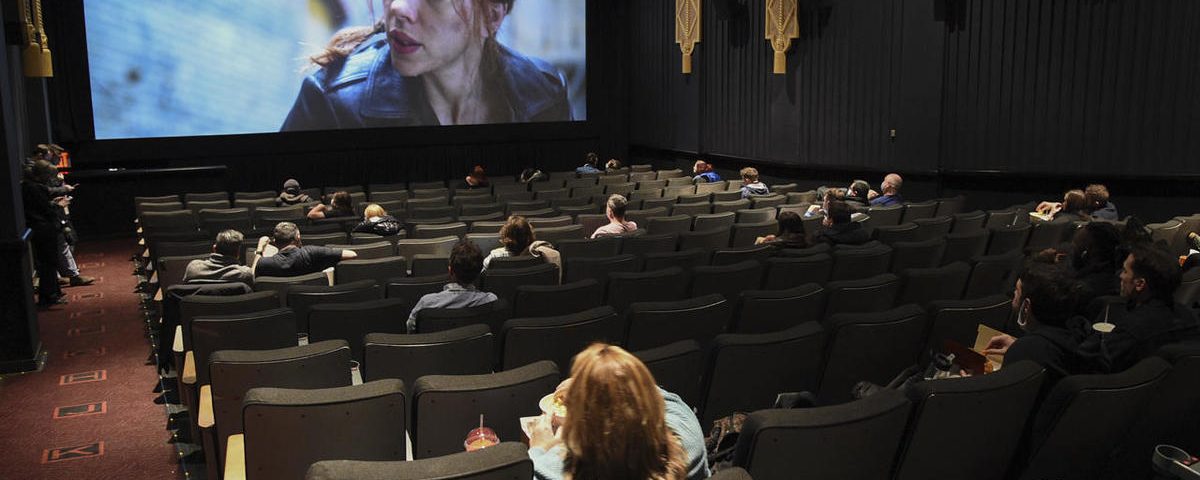In the 1950 film “Sunset Boulevard,” washed-up screen idol Norma Desmond was both glamorous and tragic – and the same might be said for a real-life movie relic at Sunset and Vine. For most of the past 60 years, the Cinerama Dome was a landmark movie palace, and a true Hollywood player since the day it opened, November 7, 1963. A theater within a geodesic dome, it cost a million dollars to build, and was site of the premiere of “It’s a Mad, Mad, Mad, Mad World” – and countless films since.
But like so many other movie houses, the Dome shut down last year, another casualty of the financial realities of the pandemic.
“The pandemic literally, overnight, decimated the movie theater business,” said Comscore senior media analyst Paul Dergarabedian. “It was so bleak that people couldn’t even imagine that theaters would be shut down for a month, let alone a year. That moment changed the world for the movie theater industry. And nobody saw it coming.”
And now, reports correspondent Tracy Smith, the Cinerama Dome’s owners say it’ll stay closed even after the pandemic.
Save the Cinerama Dome (change.org petition) But even if it’s closed for good, it doesn’t mean that moviegoing is going away. In fact, word on the street is that the movie business might just be getting ready to take off, and soar to heights no one ever thought possible.
Coming soon to a brick-and-mortar theater near you: a flock of big movies fighting for your attention:
Tom Cruise’s much-delayed “Top Gun” sequel will be in the thick of it …
So will Marvel’s “Black Widow” …
And by the fall, James Bond will finally make an entrance.
So why are studios now sending movies back to theaters? You could ask these guys: The movie “Godzilla vs. Kong” has been crushing it, with a $30 million-plus opening weekend, and that’s giving the industry reason for hope.
Dergarabedian said, “People were wondering, ‘What’s gonna happen with “Godzilla vs. Kong”?’ And there was a huge collective sigh of relief when it overperformed by a huge margin in theaters around the globe.”
“I kind of half-expected, starting this story, that at least someone would be doom-and-gloom,” said Smith.
“No,” Dergarabedian replied. “Look, here’s the thing: If ‘Godzilla vs. Kong’ had done $5 million, instead of $32 million, then you could argue with me that the theater is the product of a bygone era that would go extinct like a prehistoric lizard. But guess what? It’s not happening.”
What’s more, the movie opened “day and date” (meaning that it was released on streaming on the exact same day) and people still went out to see it.
“So, it’s no flash-in-the-pan,” Dergarabedian said. “‘Godzilla’ was a very important milestone for the industry.”
And there’s something else at work here: As movies are the lifeblood of theaters, so, too, can theaters be good for a movie – for example, last year’s Best Picture Oscar-winner, “Parasite,” says the movie’s distributor, Neon chief Elyssa Ferderoff. “I think it absolutely changed the course of ‘Parasite’ to be in theaters for as long as it was,” she said. “And the fact that it ran in theaters for six months straight only made it a bigger phenomenon and more exciting for the audience.”
Talk about exciting: The “Fast and Furious” franchise will bring its ninth installment to theaters in July – still fast, still furious, still wildly profitable.
Former movie executive Franklin Leonard said, “If you had told me, or told the industry, 30 years ago that a film franchise about fast cars with diverse stars – right? It’s one of the most diverse film franchises in the industry – would become the number-one movie in China, ever? They would’ve said you were crazy. But that’s exactly what happened.”
Leonard started The Black List, an annual survey of film producers’ favorite un-produced movie scripts, the ones that sometimes get lost in the Hollywood shuffle. And when they do get made, Black List films often win Oscars, like 2015’s “The Imitation Game.”
Now, because of the pandemic, Leonard says he expects to see more Black List films on the way: “As the pandemic began, you know, people were stuck at home. And if you are a moviemaker or television-maker, what you wanna be doing is reading good stuff that, when this is over, you can try to go make. And that’s really what we saw happen.
“When this is all over, and as we’re coming out of it, we’re going to need to share stories with each other about how we survived this moment, what it means, and what we do now,” he said.
And what we do now (or at least soon, if the experts are right) is get up off the couch and go to the movies.
Smith asked, “You can see things start to come back. What happens next?”
“I think next up is the appreciation for the movie theater, even more so than before,” Dergarabedian said. “There will be changes in the industry, [and] we don’t know what all of those are gonna be yet. But don’t count out the movie theater: it’s making that big Hollywood comeback, and we’re living through it right now.”
For more info:
Comscore Neon The Black List
Story produced by John D’Amelio. Editor: David Bhagat.

